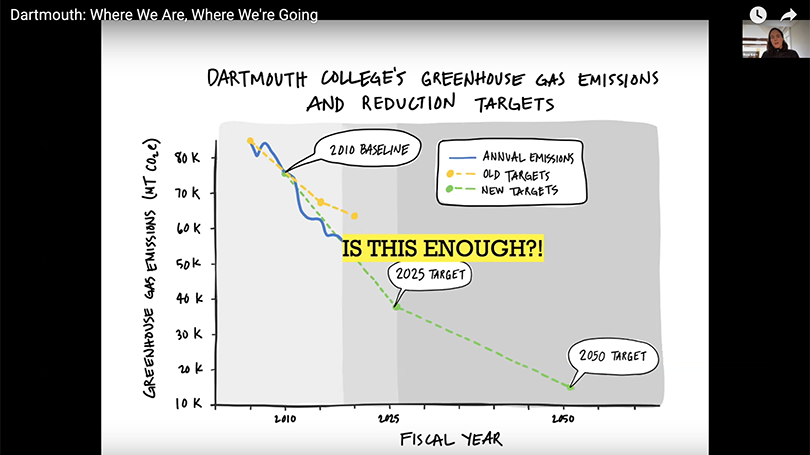
- About
- Education
- Research
- Engagement & Collaboration
- News & Events
Back to Top Nav
Back to Top Nav
Back to Top Nav
Back to Top Nav
With the completion of the new home of the Irving Institute for Energy and Society on the campus' West End on the horizon (anticipated opening in January 2022), the fall Dartmouth Energy Collaborative (DEC) Energy Seminar Series theme: "Building Sustainable, Resilient Futures: Perspectives on Buildings and Energy," is a timely area of focus.
The connections between buildings and energy aren't just a campus concern, of course —the construction and operation of residential and commercial buildings represent about 40 percent of energy consumption in the US and globally. According to International Energy Agency Director Fatih Birol, "over the next 40 years, the world is expected to build 230 billion square meters in new construction – adding the equivalent of Paris to the planet every single week." Therefore, how we build, where we build, and how we operate our homes and commercial buildings are critical considerations in averting the worst effects of climate change.
The fall DEC energy seminar series looks at buildings and energy from a variety of angles. While the kickoff session on Tuesday, September 21 stayed close to home, with Dartmouth Sustainability Director Rosi Kerr '98 exploring the past, present, and future of energy and the built environment on campus, our experiences as an energy system aren't specific to Hanover, New Hampshire. "I think of Dartmouth as kind of a microcosm of anywhere in the world," explained Kerr. "We have all the challenges that Mumbai, or Boston, or San Francisco have, just on a different scale."
Kerr zoomed in on the evolution of the College's plans to reduce its carbon footprint and the kinds of considerations that go into formulating and refining these goals. While Dartmouth's greenhouse gas emission reduction goals have increased in ambition over time, Kerr asked the audience, "Is this enough?" noting the tendency for institutions to frame goals in terms of whether something is attainable, which is often defined conservatively. In the context of the increasing urgency of climate change, she said, "I think an interesting question to try on is… what do we have to do, from a scientific perspective, and then how do we work backward?"
The type of energy used to heat, cool, and power campus is a big piece of Dartmouth's energy future. At the center of the campus energy story is the cogeneration plant, which uses number 6 heating oil to generate the steam that has been used since the early 20th century to heat and cool campus as well as supply some of our electricity. Plans to transition to a more sustainable, efficient approach to heating and cooling campus are in progress.
But another critical element of reducing our carbon footprint comes in the form of energy efficiency. As a campus with a large number of historically significant but not necessarily energy efficient buildings, we have many challenges on this front. Kerr notes, "We have improved energy efficiency at Dartmouth even though our square footage has grown… through things like fixing leaky valves…" likening these kinds of improvements to the necessary regular maintenance cars require to run well. Kerr stressed that there are still many opportunities for the College to make gains in this space.
The College has also replaced old inefficient buildings with new, more efficient ones, such as the Life Sciences building and the soon-to-open Irving Institute for Energy and Society building. Efficiency retrofits of existing buildings also have a crucial role to play in moving the College closer to its goals. "Every time we pull something apart," said Kerr, "we have an opportunity to improve how it functions. Every time we replace a building, we have an opportunity to replace it with something better."
Centering efficiency in our campus management plans is critical, but it "takes real discipline," Kerr explains. "When you're building a new building it's really easy to value engineer that efficiency out of it. When you're doing a renovation it's really easy to get rid of the unsexy things that you won't be able to see, like insulation. But that will have a really important impact over time on that building's energy consumption."
Over the course of the fall term, the DEC series will look at:
You can learn more about and register for the upcoming sessions here and view the first session here.